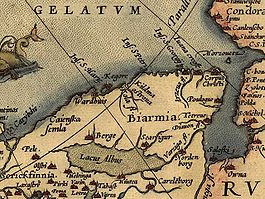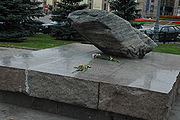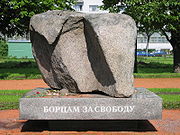
Solovki
Encyclopedia

Solovetsky Islands
The Solovetsky Islands , or Solovki , are an archipelago located in the Onega Bay of the White Sea, Russia. The islands are served by the Solovki Airport. Area: ....
, in the White Sea
White Sea
The White Sea is a southern inlet of the Barents Sea located on the northwest coast of Russia. It is surrounded by Karelia to the west, the Kola Peninsula to the north, and the Kanin Peninsula to the northeast. The whole of the White Sea is under Russian sovereignty and considered to be part of...
). It was the "mother of the GULAG
Gulag
The Gulag was the government agency that administered the main Soviet forced labor camp systems. While the camps housed a wide range of convicts, from petty criminals to political prisoners, large numbers were convicted by simplified procedures, such as NKVD troikas and other instruments of...
" according to Aleksandr Solzhenitsyn
Aleksandr Solzhenitsyn
Aleksandr Isayevich Solzhenitsyn was aRussian and Soviet novelist, dramatist, and historian. Through his often-suppressed writings, he helped to raise global awareness of the Gulag, the Soviet Union's forced labor camp system – particularly in The Gulag Archipelago and One Day in the Life of...
. Historically Solovetsky Islands have been the location of the famous Russian Orthodox Solovetsky Monastery
Solovetsky Monastery
Solovetsky Monastery was the greatest citadel of Christianity in the Russian North before being turned into a special Soviet prison and labor camp , which served as a prototype for the GULag system. Situated on the Solovetsky Islands in the White Sea, the monastery braved many changes of fortune...
complex, which repelled foreign attacks during the Time of Troubles
Time of Troubles
The Time of Troubles was a period of Russian history comprising the years of interregnum between the death of the last Russian Tsar of the Rurik Dynasty, Feodor Ivanovich, in 1598, and the establishment of the Romanov Dynasty in 1613. In 1601-1603, Russia suffered a famine that killed one-third...
, the Crimean War
Crimean War
The Crimean War was a conflict fought between the Russian Empire and an alliance of the French Empire, the British Empire, the Ottoman Empire, and the Kingdom of Sardinia. The war was part of a long-running contest between the major European powers for influence over territories of the declining...
, and the Russian Civil War
Russian Civil War
The Russian Civil War was a multi-party war that occurred within the former Russian Empire after the Russian provisional government collapsed to the Soviets, under the domination of the Bolshevik party. Soviet forces first assumed power in Petrograd The Russian Civil War (1917–1923) was a...
.
By Lenin's decree, the monastery buildings were turned into Solovetsky Lager' Osobogo Naznachenia (SLON), that is, the "Solovki Special Purpose Camp". The acronym of the camp name is a sullen word play for those who speak Russian
Russian language
Russian is a Slavic language used primarily in Russia, Belarus, Uzbekistan, Kazakhstan, Tajikistan and Kyrgyzstan. It is an unofficial but widely spoken language in Ukraine, Moldova, Latvia, Turkmenistan and Estonia and, to a lesser extent, the other countries that were once constituent republics...
: slon means "elephant
Elephant
Elephants are large land mammals in two extant genera of the family Elephantidae: Elephas and Loxodonta, with the third genus Mammuthus extinct...
". It was one of the first "corrective labor camp
Labor camp
A labor camp is a simplified detention facility where inmates are forced to engage in penal labor. Labor camps have many common aspects with slavery and with prisons...
s", a prototype of the Gulag
Gulag
The Gulag was the government agency that administered the main Soviet forced labor camp systems. While the camps housed a wide range of convicts, from petty criminals to political prisoners, large numbers were convicted by simplified procedures, such as NKVD troikas and other instruments of...
system. In the beginning of 1924 sometimes the double name was used Severnye (Solovetskiye) Lagerya OGPU (Northern (Solvki) camps of OGPU)
In 1926 the Solovki camp was turned into a prison, partly because of the conditions which made escape near impossible and partly because the monastery had been used as a political prison by the Russian imperial administration
Russian Empire
The Russian Empire was a state that existed from 1721 until the Russian Revolution of 1917. It was the successor to the Tsardom of Russia and the predecessor of the Soviet Union...
. The treatment of the prisoners attracted much criticism in Western Europe and the USA. After a thorough cleanup, the Soviet government sent the proletarian writer Maksim Gorky to the camp in an attempt to counter this criticism. Indeed, Gorky wrote a very favourable essay, which praised the beautiful nature of the islands. How much Gorky knew about the real conditions, remains a mystery.
The prison was closed in 1939 because the Second World War was imminent, while the camp was situated close to the border with Finland
Finland
Finland , officially the Republic of Finland, is a Nordic country situated in the Fennoscandian region of Northern Europe. It is bordered by Sweden in the west, Norway in the north and Russia in the east, while Estonia lies to its south across the Gulf of Finland.Around 5.4 million people reside...
. The buildings were then transformed into a naval base. The navy cadet corps was deployed in the monastery buildings, one of the notable cadets was the future author Valentin Pikul
Valentin Pikul
Valentin Savvich Pikul was a popular and prolific Soviet historical novelist of Ukrainian-Russian heritage. He lived and worked in Riga....
. The Orthodox Church reestablished the monastery in 1992, the year when the ensemble was included into UNESCO
UNESCO
The United Nations Educational, Scientific and Cultural Organization is a specialized agency of the United Nations...
's World Heritage List.
Notable prisoners


Intelligentsia
The intelligentsia is a social class of people engaged in complex, mental and creative labor directed to the development and dissemination of culture, encompassing intellectuals and social groups close to them...
, and represent the cream of Tsarist and revolutionary-period Russia. These include:
- Alexander Anisimov (:ru:Анисимов, Александр Иванович (искусствовед))- art restorationArt restorationArt restoration is related to art conservation. Restoration is a process that attempts to return the work of art to some previous state that the restorer imagines was the "original". This was commonly done in the past...
expert and art historian - Nikolai Antsiferov - historian
- Vladimir ArtemyevVladimir ArtemyevVladimir Andreyevich Artemyev was a Soviet Russian rocket scientist at the Gas Dynamics Laboratory. He was one of the inventors of the Katyusha. The first rocket propelled by smokeless trotyl-pyroxylin powder was launched under his direction in 1928....
- inventor - Sergei Askoldov (alias S. Alekseev, born Sergei Alekseyevich Kozlov), philosopher and theologian http://books.google.com/books?id=MkXAzSbkU8QC&pg=PA306&lpg=PA306&dq=alekseyev-askoldov&source=bl&ots=xIJXlfOu8k&sig=AjmwaIcSiNK8H_1JCyBM3d9DsqM&hl=en&ei=GL2YTvicKMWviAKlroHMDQ&sa=X&oi=book_result&ct=result&resnum=3&sqi=2&ved=0CCcQ6AEwAg#v=onepage&q&f=false
- Mikhail BakhtinMikhail BakhtinMikhail Mikhailovich Bakhtin was a Russian philosopher, literary critic, semiotician and scholar who worked on literary theory, ethics, and the philosophy of language...
- historian - Vladimir N. BeneshevichVladimir N. BeneshevichVladimir Nicolayevich Beneshevich was a scholar of Byzantine history and canon law, and a philologer and paleographer of the manuscripts in that sphere....
- historian, paleographer - A.V.Bobrishev-Pushkin - descendant of Decembrist Pavel Sergeievich Bobrishev-Pushkin
- Osip Braz - artist
- Leonid FeodorovLeonid FeodorovBlessed Leonid Ivanovich Feodorov was Exarch of the Russian Catholic Church, in addition to being a survivor of the GULAG. After painstaking investigation, he was beatified by Pope John Paul II on June 27, 2001.-Early life:...
- BishopBishopA bishop is an ordained or consecrated member of the Christian clergy who is generally entrusted with a position of authority and oversight. Within the Catholic Church, Eastern Orthodox, Oriental Orthodox Churches, in the Assyrian Church of the East, in the Independent Catholic Churches, and in the...
and ExarchExarchIn the Byzantine Empire, an exarch was governor with extended authority of a province at some remove from the capital Constantinople. The prevailing situation frequently involved him in military operations....
of the Russian Catholic ChurchRussian Catholic ChurchThe Russian Catholic Church is a Byzantine Rite church sui juris in full union with the Catholic Church. Historically it represents a schism from the Russian Orthodox Church. It is now in full communion with and subject to the authority of the Pope as defined by Eastern canon law...
. - Pavel Alexandrovich Florensky - priest, scientist, encyclopaedist
- Konstantine GamsakhurdiaKonstantine GamsakhurdiaKonstantine Gamsakhurdia was a Georgian writer and public figure, who, along with Mikheil Javakhishvili, is considered to be one of the most influential Georgian novelists of the 20th century...
— Georgian writer - G.J.Gordon - historian
- A.K.Gorsky - poet
- Archimandrite Illarion (Troitsky, :ru:Иларион (Троицкий)) - Professor of the Moscow Theological Academy
- Academician Dmitry Sergeyevich Likhachov - philologist
- Mirjaqip DulatuliMirjaqip DulatuliMirjaqip Dulatuli Mirjaqip Dulatuli Mirjaqip Dulatuli (Kazakh: Міржақып Дулатұлы, Russian: Миржакып Дулатов (1885–1935) was a Kazakh poet, writer and one of leaders of Kazakh nationalist Alash Orda government. He also is known to have used the pen names Madiyar and Arghyn...
- Kazakh writer - I.V. Popov - Professor of the Moscow Theological Academy
- Varlam ShalamovVarlam ShalamovVarlam Tikhonovich Shalamov , baptized as Varlaam, was a Russian writer, journalist, poet and Gulag survivor.-Early life:Varlam Shalamov was born in Vologda, Vologda Governorate, a Russian city with a rich culture famous for its wooden architecture, to a family of a hereditary Russian Orthodox...
- writer - Vladimir V. TchernavinVladimir V. TchernavinVladimir V. Tchernavin was a Russian-born ichthyologist who became famous as one of the first and few prisoners of the Soviet Gulag system who managed to escape abroad.-Early life:Tchernavin was born in 1887 into a noble family of modest means...
- ichthyologist - H.H.Vinogradov - ethnographer
- Oleg V. Volkov - writer
- M.N.Voronoy - poet
- Jamo bey HajinskiJamo bey HajinskiJamo bey Hajinski Suleyman oglu was an Azerbaijani publicist, public figure and politician. He served in the first, fourth and fifth cabinets of Azerbaijan Democratic Republic as its State Controller and Minister of Postal Service and Telegraph....
- State ControllerMinistry of Taxes (Azerbaijan)The Ministry of Taxes of Azerbaijan Republic is a governmental agency within the Cabinet of Azerbaijan in charge of regulating taxes and tax collection activities in all sectors of the economy of Azerbaijan Republic...
and Minister of Transportation, Postal Service and Telegraph of Azerbaijan Democratic RepublicAzerbaijan Democratic RepublicThe Azerbaijan Democratic Republic was the first successful attempt to establish a democratic and secular republic in the Muslim world . The ADR was founded on May 28, 1918 after the collapse of the Russian Empire that began with the Russian Revolution of 1917 by Azerbaijani National Council in...
Naftaly Frenkel
Naftaly Frenkel
Naftaly Aronovich Frenkel ; was a Soviet citizen and Chekist . Frenkel is best known for his role in the organisation of work in the Gulag, starting from the forced labor camp of the Solovetsky Islands, which is recognised as one of the earliest sites of the Gulag. -Origins:Naftaly Frenkel's...
was at first a prisoner, but later became commander of the camp.
Solovki camp in art and literature
- Aleksandr SolzhenitsynAleksandr SolzhenitsynAleksandr Isayevich Solzhenitsyn was aRussian and Soviet novelist, dramatist, and historian. Through his often-suppressed writings, he helped to raise global awareness of the Gulag, the Soviet Union's forced labor camp system – particularly in The Gulag Archipelago and One Day in the Life of...
spends a great deal of Part III of The Gulag ArchipelagoThe Gulag ArchipelagoThe Gulag Archipelago is a book by Aleksandr Solzhenitsyn based on the Soviet forced labor and concentration camp system. The three-volume book is a narrative relying on eyewitness testimony and primary research material, as well as the author's own experiences as a prisoner in a gulag labor camp...
discussing the development of Solovki and the conditions there during the early Soviet regime. - Vladimir V. TchernavinVladimir V. TchernavinVladimir V. Tchernavin was a Russian-born ichthyologist who became famous as one of the first and few prisoners of the Soviet Gulag system who managed to escape abroad.-Early life:Tchernavin was born in 1887 into a noble family of modest means...
was a prisoner in the camp in the early 1930s. He has described his experiences there in his 1934 book I Speak for the Silent Prisoners of the Soviets which he published after his escape abroad. - The fictional town of Solovets in Monday Begins on SaturdayMonday Begins on SaturdayMonday Begins on Saturday is a 1964 science fiction / science fantasy novel by Boris and Arkady Strugatsky. Set in a fictional town in northern Russia, where highly classified research in magic occurs, the novel is a satire of Soviet scientific research institutes, complete with an inept...
is a hint at Solovetsky MonasterySolovetsky MonasterySolovetsky Monastery was the greatest citadel of Christianity in the Russian North before being turned into a special Soviet prison and labor camp , which served as a prototype for the GULag system. Situated on the Solovetsky Islands in the White Sea, the monastery braved many changes of fortune...
. - In The Master and MargaritaThe Master and MargaritaThe Master and Margarita is a novel by Mikhail Bulgakov, woven around the premise of a visit by the Devil to the fervently atheistic Soviet Union. Many critics consider the book to be one of the greatest novels of the 20th century, and one of the foremost Soviet satires, directed against a...
by Mikhail BulgakovMikhail BulgakovMikhaíl Afanásyevich Bulgákov was a Soviet Russian writer and playwright active in the first half of the 20th century. He is best known for his novel The Master and Margarita, which The Times of London has called one of the masterpieces of the 20th century.-Biography:Mikhail Bulgakov was born on...
, Ivan Ponyrov (the poet also known as Ivan Homeless) suggests to WolandWolandWoland is a fictional character in the book The Master and Margarita by the Russian author Mikhail Bulgakov. Woland is the mysterious foreigner and professor whose visit to Moscow sets the plot rolling and turns the world upside-down. He appears differently to different people. "[t]he first says...
(a German name for Satan) that Immanuel KantImmanuel KantImmanuel Kant was a German philosopher from Königsberg , researching, lecturing and writing on philosophy and anthropology at the end of the 18th Century Enlightenment....
should be sent to Solovki as punishment for his attempts to prove the existence of God. Woland replies "Thats just the place for him! I told him so that day at breakfast...[However] It is impossible to send him to Solovki for the simple reason that he has resided for the past hundred-odd years in places considerably more remote than Solovki, and, I assure you, it is quite impossible to get him out of there." - Marina Goldovskaya's 1987 documentary film Solovky Power explores the camp at Solovki and its status as the first of the Soviet labour camps. It features interviews with former prisoners, including D. S. Likhachev.
External links
- Baron, Nick. Production and Terror: The Operation of the Karelian GULAG, 1933—1939, Cahiers du Monde russe, 43/1, Janvier-mars 2002, pp. 139–180.
- Jakobson, Micheal. Origins of the GULAG: The Soviet Prison Camp System, 1917-1934, University Press of Kentucky, 1993.ISBN 0-813-11796-8. Available on Google Books
- Labor Camp Socialism: The Gulag in the Soviet Totalitarian System by Galina Mikhaĭlovna Ivanova, Carol Apollonio Flath, Donald J. Raleigh, Translated by Carol Apollonio Flath, published by M.E. Sharpe, 2000. ISBN 0765604264. Available on Google Books
- Vladimir V. Tchernavin, I speak for the silent prisoners of the Soviets, available online at The Internet Archive
- Forced Labor Camps Open Society Archives

